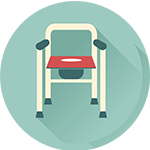Physiotherapy Offers Ways to Help Seniors with Walking Difficulties
As we age, our body starts to lose muscle strength and balance, affecting our ability to move around independently. Seniors may face challenges in daily activities such as bathing, toileting or walking. With physiotherapy, seniors may improve their mobility. It may also prevent weakening of muscles and loss of balance, thus reducing their risk of falls and fractures.
We asked you to send in burning questions on caregiving on our Facebook page, and this month, Physiotherapist Yap Thian Yong answers your questions in “You Ask, We Answer”.

Yap Thian Yong
Physiotherapist - St Luke's Hospital
The 29 year-old takes time to understand his patients and plans rehabilitation programmes to help them stay independent. Always looking to improve patient care, Thian Yong worked with his colleagues to introduce a ceiling-mounted track harness that supports patients when they do walking and balancing exercises. Learn more about Thian Yong in this article.
Does physiotherapy help if an elderly loved one has difficulty walking?
 Answer:
Answer:
The first step is for the physiotherapist to look into the senior’s needs. Next, he or she may suggest some suitable exercises to improve the senior’s strength, balance, flexibility and stamina. If the senior needs help with walking, the physiotherapist will be able to give advice on the use of walking aids or assistive walking devices. The therapist can also teach you safe ways to support the senior in moving around.
How do I help a senior who has difficulty walking if she is using a walking stick now?
 Answer:
Answer:
For an elderly person using a walking stick, check that the senior is holding it with his or her stronger hand. You can provide additional help by supporting their weaker side. This way, the senior can put some weight onto your hand. For added safety, place your other arm around the senior’s waist. Before assisting the senior, make sure you are well and fit enough.
When at home, you could place a chair along the way for the senior to rest if he or she is unable to walk to the toilet at one go.
For more ways to help your elderly loved one, you may wish to arrange an appointment to consult a physiotherapist.
How can I ensure my loved one can keep going to the toilet independently? If an elderly person has problems moving around and cannot control his/ her bowel movement, is wearing an adult diaper the only solution?
 Answer:
Answer:
For the senior to visit the toilet independently, he or she would need to be able to walk. Encourage your elderly loved one to exercise for at least 2.5 hours a week to improve the ability to move around. Activities such as brisk walking, stair climbing, jogging or swimming, depending on the senior’s tolerance level, help to improve the loved one’s health and fitness.
Grab bars and ramps to handle steps and kerbs are other ways to assist the senior to visit the toilet safely and independently. The HDB Enhancement for Active Seniors (EASE) programme provides services such as installing special tools around your flat, making it safer for seniors. For details on how to qualify and apply, refer to HDB’s Website.
If the senior has difficulty walking, you may consider equipment such as mobile commode or stationary commode (for seniors with difficulty getting up from a low toilet seat) or urinal bottle.
Eligible seniors may tap on the Seniors’ Mobility and Enabling Fund (SMF) for financial assistance on getting mobility aids such as a commode, walking stick or wheelchair.
 |
 |
 |
For seniors who have bowel or bladder problems, you can get advice from a urologist. In some cases, weak muscles may cause difficulty in controlling bowel or bladder movement. Physiotherapy may be able to help retrain the affected muscles to improve your loved one’s control over his or her bowel or bladder movement.


